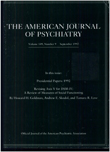Use of neuroleptic-induced extrapyramidal symptoms to predict future vulnerability to side effects
Abstract
OBJECTIVE: Susceptibility to neuroleptic-induced extrapyramidal syndromes varies widely, even within age and sex subgroups. Individual vulnerability to extrapyramidal syndromes has been assumed to explain this, but the utility of past history for predicting future occurrence of extrapyramidal syndromes has not been studied extensively. This investigation was undertaken to determine whether patients' previous histories of extrapyramidal syndromes predict future episodes of extrapyramidal syndromes and to compare the importance of this predictive factor with patient age, sex, neuroleptic dose, and anticholinergic dose as predictors of extrapyramidal syndromes. METHODS: The charts of 62 schizophrenic patients with multiple neuroleptic treatment episodes were reviewed. Extrapyramidal syndromes, neuroleptic drug doses, and anticholinergic drug doses during the first 21 days of each treatment episode were recorded. RESULTS: Previous extrapyramidal syndromes correctly predicted extrapyramidal syndromes in subsequent treatments for 84% of the patients. Variations in neuroleptic potency, neuroleptic dose, and anticholinergic dose partially explained incorrect predictions. CONCLUSIONS: These results support the hypothesis that patients with a history of extrapyramidal syndromes are at greater risk for future extrapyramidal syndromes. If confirmed, these results strongly support individual susceptibility as a major predictor of extrapyramidal syndromes and indicate that prophylaxis of extrapyramidal syndromes should be considered for patients who have previously suffered extrapyramidal syndromes from similarly prescribed neuroleptic therapy.
Access content
To read the fulltext, please use one of the options below to sign in or purchase access.- Personal login
- Institutional Login
- Sign in via OpenAthens
- Register for access
-
Please login/register if you wish to pair your device and check access availability.
Not a subscriber?
PsychiatryOnline subscription options offer access to the DSM-5 library, books, journals, CME, and patient resources. This all-in-one virtual library provides psychiatrists and mental health professionals with key resources for diagnosis, treatment, research, and professional development.
Need more help? PsychiatryOnline Customer Service may be reached by emailing [email protected] or by calling 800-368-5777 (in the U.S.) or 703-907-7322 (outside the U.S.).



